work&life in Japan | N1 related study | tea addict and art enthusiast
Don't wanna be here? Send us removal request.
Text
✤2025年6月16日
名詞 // Nouns:
政策(せいさく)policy 党(とう)political party
動詞 // Verbs:
打ち出す(うちだす)to work out, to hammer out, to come out with 奪う(うばう)to rob, to take away 手間取る(てまどる)to take a long time 反省する(はんせい)to reflect (on oneself) ���み合わせる(よみあわせる)to read out and compare/check
形容詞 // Adjectives:
乏しい(とぼしい)meagre, to be lacking
その他 // Other:
政権を奪われる to be robbed of political power 政策を打ち出す to come forward with a policy 知識が乏しい to be lacking in knowledge 理解に手間取るかもしれません It might take a long time to understand
9 notes
·
View notes
Text
✤2025年4月19日
名詞 // Nouns:
慣用句(かんようく)idiom 行動力(こうどうりょく)ability to take action 死別(しべつ)bereavement 発話(はつわ)utterance
動詞 // Verbs:
足を引きずる(あし を ひきずる)to limp 可愛がる(かわいがる)to be affectionate 行動に移す(こうどう に うつす)to act out しゃがみ込む(しゃがみこむ)to crouch down 張り裂ける(はりさける)to burst (open) 引きずる(ひきずる)to drag, to pull (along) 引っ張る(ひっぱる)to pull (tight) ぼんやりする to idle, to be absent-minded
形容詞 // Adjectives:
慣用的(かんようてき)idiomatic 独断的(どくだんてき)dogmatic, arbitrary 悲観的(ひかんてき)pessimistic 平凡な(へいぼん)ordinary
形容動詞 // Adverbs:
どうも somewhat ともすれば being prone to ぼんやりと idly
その他 // Other:
頭で考える(あたま で かんがえる)to think with one's head 肩をたたく(かた を たたく)to pat on the shoulder この時とばかり���(このとき)"make hay while the sun shines" (=taking an unexpected opportunity) その場(そのば)on the spot, right then and there 他人の足を引っ張る(ひっぱる)to hold others from achieving success, to stand in the way of others 他人を批判する(ひはん)to judge other people 動物を可愛がる(どうぶつ を かわいがる)to love/cherish animals 涙ながらに(なみだながらに)under tears 部屋に鍵をかける(へや に かぎ を かける)to lock a room 物事を大袈裟に言う(ものごと を おおげさ に いう)to exaggerate things
22 notes
·
View notes
Text
メディアやSNSは、人の興味を引かせるために、ネガティブな情報を流すことで、視聴率を稼いだり、アクセス数を増やそうとしています[…]。(武田双雲. 「ありがとう」の教科書. 2022, p.7.)
人の興味を引かせる (ひと の きょうみ を ひかせる) to capture people's interest/attention ネガティブな情報を流す (ねがてぃぶな じょうほう を ながす) to spread negative information 視聴率を稼ぐ (しちょうりつ を かせぐ) to gain viewership アクセス数を増やす (あくせすすう を ふやす) to increase number of hits/visits, to increase traffic
"Media and social networking services are trying to gain viewership and increase traffic by spreading negative information in order to attract people's interest."
#studyblr#langblr#japanese langblr#japanese language#learning japanese#japanese vocabulary#study japanese#japanese media#japanese books#books and reading#books#booklr#book quotes#book quotations#light academia#social media#japan
16 notes
·
View notes
Text
小説の語彙力(3)
名詞 // Nouns:
行きつけのバー(いきつけ)my go-to bar 会食(かいしょく)dining together 結婚披露宴(けっこんひろうえん)wedding reception banquet 用件(ようけん)business, thing to be done
動詞 // Verbs:
はしごする going several places in succession (as in barhopping) 控える(ひかえる)refrain 披露する(ひろう)announce, reveal, showcase
形容詞 // Adjectives:
上機嫌な(じょうきげん)cheerful, in a good mood 他愛ない(たわいない)foolish ちょっとした minor, trivial, petty
その他 // Other:
急ぎではない(いそぎではない)not in a hurry こちらから / こっちから from my side 電話をかける make a phone call 電話を切る hang up, end a telephone conversation 仕事で外回りがある(そとまわり)have work outside the office 深くは気に留めない(ふかくは き に とめない)not care deeply
#小説の語彙力#語彙リスト#japanese langblr#langblr#japanese language#language learning#japanese vocabulary#japanese studyblr#japanese#japan#learning japanese#reading in japanese#study notes#study japanese#studying#study motivation#nihongo#日本語#日本語の勉強
37 notes
·
View notes
Text
オフィスで耳にした単語(1)
名詞 // Nouns
演習(えんしゅう)practice 開発費(かいはつひ)development cost 奇数(きすう)uneven number 後半(こうはん)latter half 借金(しゃっきん)debt, loan 実践(じっせん)practice, implementation 消防設備点検(しょうぼうせつびてんけん)Fire Safety Equipment Inspection 消防(しょうぼう)fire fighting 設備(せつび)equipment 前半(ぜんはん)first half 貸与(たいよ)loan, lending 点検(てんけん)inspection 添付ファイル(てんぷ)attached file 備品(びひん)fixtures, furnishing, equpiment 部署(ぶしょ)department 予算(よさん)budjet
動詞 // Verbs
該当する(がいとう)meet (qualifications), falling under, being applicable 加担する(かたん)assist, participate, support 換算する(かんさん)convert (currency) 記載する(きさい)list, note, record 計算する(けいさん)calculate 実施する(じっし)carry out 借金する(しゃっきん)borrow money 出社する(しゅっしゃ)go to the office 請求する(せいきゅう)demand, charge, bill 使いこなす(つかいこなす)handle, master 投資する(とうし)invest 並び替える(ならびかえる)arrange 配布する(はいふ)distribute 儲ける(もうける)make profit, earn
形容詞 // Adjectives
細かい(こまかい)small 精神的な(せいしんてき)mental, spiritual, moral
その他 // Other
気合が入る(きあい が はいる)be motivated 掲題の件ですが…(けいだい)concerning the matter mentioned before (common expression in business emails) ご一読ください(いちどく)please, read it through 承知いたしました(しょうち)Understood 即座に(そくざ)right there on the spot 即興で(そっきょう)improvised, without any preperation 本日の勤務を終了いたします(ほんじつ は きんむ を しゅうりょう いたします)I am finishing work for today
#オフィスで耳にした単語#語彙リスト#敬語#japanese langblr#langblr#japanese language#language learning#japanese vocabulary#japanese studyblr#japanese#japan#learning japanese#study notes#studying#study movitation#nihongo#日本語#日本語の勉強#working in japan
190 notes
·
View notes
Text



2024-05-27// あと1週間足らず日本に発つ。
#日記#イラスト#japanese langblr#langblr#studyblr#japanese studyblr#learning japanese#japan#japanese#study blog#japanese language#study motivation#studyspo#study aesthetic#dark academia#light academia#art#drawing#illustration#sketchbook#manga#study desk#desk aesthetic
36 notes
·
View notes
Text
部屋探し|Apartment Hunting

Let me share with you my current struggles on finding a place to stay in Japan with this long vocabulary list!
住宅(じゅうたく)housing, residential building
住宅街(じゅうたくがい)residential area
最寄り駅(もよりえき)nearest train station
共同住宅(きょうどうじゅうたく)residential complex, apartment house
不動産屋(ふどうさんや)real estate agent
物件(ぶっけん)object, property (real estate)
ネット上(じょう)on the internet
掲載する(けいさい)post, insert (advertisement)
家賃(やちん)rent
共益費(きょうえきひ)common fee, utility fee
加算する(かさん)add
月額(げつがく)monthly amount
初期費用(しょきひよう)initial costs
入居する(にゅうきょ)move into
翌月(よくげつ)next month
翌月分(よくげつぶん)next month's rent
礼金(れいきん)key money (fee paid for rental rights)
敷金(しききん)deposit
保証金(ほしょうきん)deposit
清掃費(せいそうひ)cleaning fee
火災保険料(かさいほけんりょう)fire insurance fee
内見(ないけん)viewing
賃貸(ちんたい)lease, rent
賃貸借契約(ちんたいしゃけいやく)rental contract
借り主(かりぬし)debtor, tenant
貸主(かしぬし)lender, landlord
大家さん(おおや)landlord
一時に(いちどき)at once
滞納(たいのう)falling behind (with a payment)
Moving into a Japanese property comes with high initial costs which can be broken down into numerous different fees. Unfortunately, share houses are not necessarily fully excluded from this, but it really depends on the company. I'm glad that I could take some time to work and save up money before going to Japan. The first month will be very expensive.
#語彙リスト#japanese langblr#langblr#studyblr#japanese studyblr#learning japanese#japanese vocabulary#japan#japanese#study blog#japanese language#japanese studyspo#study motivation#studyspo#study notes#vocabulary#vocabulary list#jlpt n1#nihongo#日本語#日本語の勉強#life in japan
292 notes
·
View notes
Text
2024-04-28// 今年、ようやく日本に戻れることを嬉しく思っている。日本に子会社がある母国の会社の面接に合格した。つまり、インターンシップの一環として日本で働き始める。
#日記#japanese langblr#japan#life in japan#日本#日本語#日本語の勉強#language learning#learning japanese#japanese studyblr#studyblr#study motivation
16 notes
·
View notes
Text
小説の語彙力(2)

名詞 // Nouns:
霧(きり)fog しかめ面(しかめづら)frown 疎遠(そえん)estrangement 手がかり(てがかり)handhold; clue, lead 髭面(ひげづら)bearded face 閃き(ひらめき)insight, flash (e.g. of inspiration)
動詞 // Verbs:
買い被る(かいかぶる)overestimate 再現する(さいげん)reenact, recreate 下げる(さげる)clear (plates from a table) 接触する(せっしょく)come into contact, get in touch 撤回する(てっかい)withdraw, retract 呪う(のろう)curse 閃く(ひらめく)flash, sparkle
形容詞 // Adjectives:
空の(から)empty 肝心な(かんじん)essential, crucial 切実な(せつじつ)urgent, serious 厄介な(やっかい)bothersome
その他 // Other:
気が進まない(き が すすまない)reluctant to do sth. 霧がかかっている be foggy 言葉を切る(ことば を きる)stop talking せいぜい at the most, to the utmost 羽目・破目になる(はめ)become stuck in an unpleasant situation
#小説の語彙力#語彙リスト#japanese langblr#language blog#language learning#learning japanese#studyblr#japanese studyblr#study japanese#japanese vocabulary#japan#japanese#japanese language#study notes#vocabulary#vocabulary list#日本語#日本語の勉強#nihongo#jlpt n1
46 notes
·
View notes
Text
小説の語彙力(1)

名詞 // Nouns:
基調(きちょう)basic tone, basic theme 後年(こうねん)in (one's) later years 権現(ごんげ)incarnation 酸味(さんみ)sourness, sour taste 駄洒落(だじゃれ)bad joke 店内装飾(てんないそうしょく)in-store decoration 末裔(まつえ)descendant 装い(よそおい)outfit
動詞 // Verbs:
あやす soothe, comfort, humor 利かせる(きかせる)season (e.g. with salt), bring out, use 渋る(しぶる)be reluctant, be unwilling, balk なつく become emotionally attached 放る(ほうる)neglect, abandon, leave alone
形容詞 // Adjectives:
渋い(しぶい)bitter, sour, harsh, grim
その他 // Other:
後々(のちのち)later 機転が利く(きてん が きく)be quick-witted 散々(さんざん)severely, harshly 駄々をこねる(だだ)throw a tantrum
#小説の語彙力#語彙リスト#japanese langblr#langblr#language blog#learning japanese#language learning#study japanese#japanese vocabulary#japan#japanese#japanese language#study notes#japanese studyblr#vocabulary#vocabulary list#日本語#日本語の勉強#nihongo#jlpt n1
155 notes
·
View notes
Text
改まった形|Polite Forms
In formal settings like in a business meeting or at a public gathering some words are switched with politer forms. You often hear them when somebody is giving a speech, holding a presentation or on TV. But they appear in written form as well, especially in business context. Basically, everywhere where keigo is used, it is also expected to apply politer forms.
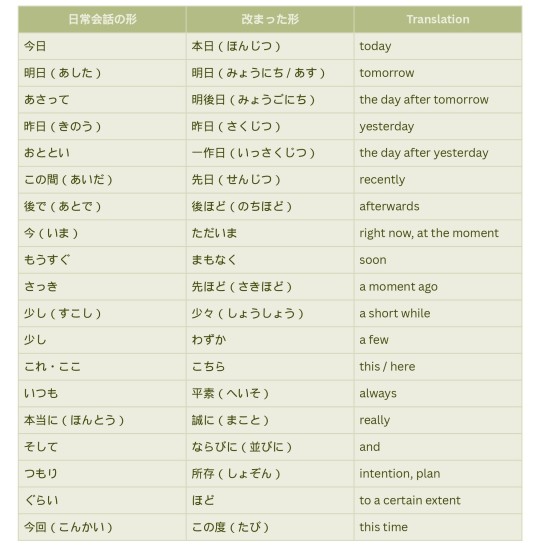
#文法#敬語#japanese langblr#langblr#studyblr#study movitation#learning japanese#japanese vocabulary#japan#japanese#study blog#study notes#language blog#keigo#japanese studyblr#japanese grammar#japanese language#日本語#日本語の勉強#nihongo
382 notes
·
View notes
Text


2024-02-28// ようやく黒ずんだシルバーアクセサリーを磨いた。面白いことに、アクセサリーのお店で働いているといっても、自分ではあまりアクセサリーは持っていない。同僚は本当にいい人ばかりだから、バイトを辞めるときはちょっと寂しいかもしれない。
#日記#japanese langblr#studyblr#study aesthetic#study notes#light academia#pastel academia#japan#japanese#study blog#studyspo#study movitation#japanese studyspo#university#college#books#reading#studying#student#student life#lofi#lofi aesthetic#earrings#silver#jewelry#rose#necklace#日本語
64 notes
·
View notes
Text

This post is an addition to 敬語の5分類|The 5 Types of keigo.
尊敬語の特定形
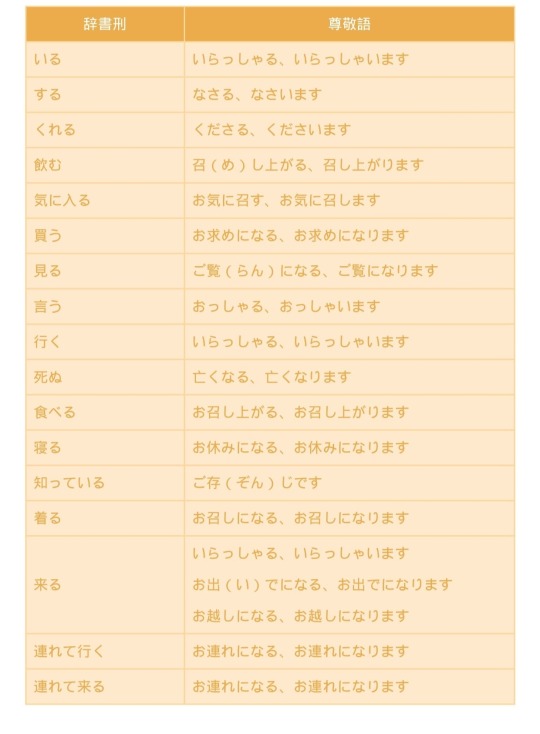
謙譲語Ⅰの特定形
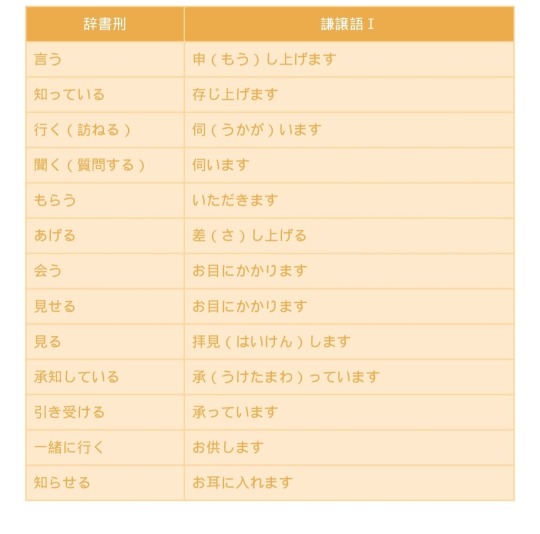
謙譲語Ⅱの特定形
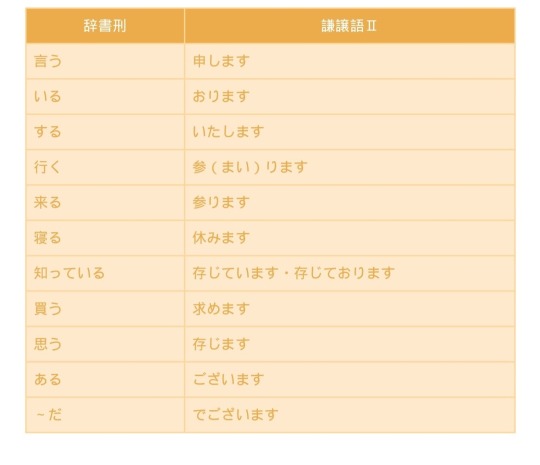
#文法#敬語#japanese langblr#learning japanese#japanese vocabulary#japanese#japanese language#keigo#study notes#japanese studyblr#japanese studyspo#japanese grammar#nihongo#日本語#日本語の勉強
103 notes
·
View notes
Text
敬語の5分類|The 5 Types of keigo
In the Japanese language it is possible to show respect towards another person by replacing words, mostly verbs, with politer equivalents. This can be done by using elevating expressions for the actions of your superior or degrading expressions for your own actions.
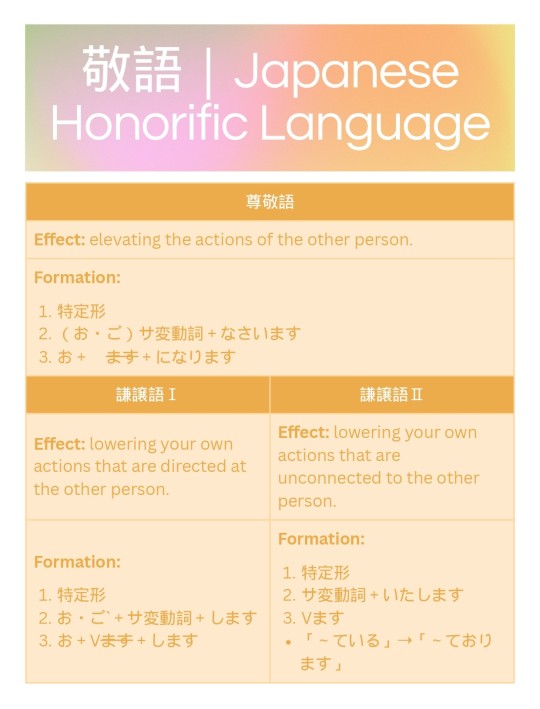
Overview: Verb Formation Rules for sonkeigo 尊敬語, kenjōgo I 謙譲語Ⅰ and kenjōgo II 謙譲語Ⅱ (also known as teichōgo 丁重語).
In a guideline released by the Japanese Agency for Cultural Affairs in the year 2007 keigo has been divided into five types: 尊敬語・謙譲語Ⅰ・謙譲語Ⅱ(丁重語)・丁寧語・美化語. The first three types demonstrate the most complex rules, hence why I summarized them in the chart above for a quick overview. Hereafter, you can find thorough introductions to each type.
尊敬語|Respectful Language
Sonkeigo is the most basic method to pay special respect towards a teacher, a superior or a client. This can be done by switching the verb (refering to the action of your superior) with its passive form.
e.g. 読みます → 読まれます
However, the degree of politeness isn't that high. Hence, it is important to learn the following formation rules as well:
1)特定形 |Special forms
Some verbs have a fixed forms. If a verb has a special form it is to be used.¹
e.g. いる・行く・来る → いらっしゃいます
2)サ変動詞+なさいます
In this context サ変動詞 refers to nominal verbs. Basically, nouns that can be turned into verbs by adding する. It is possible to add お or ご infront of the verb but it can be also omitted if unsure which prefix is the right one.
e.g. 出発する → (ご���出発なさいます
3)お+Ⅴます+になります
This formation rule is for all verbs that do not belong into either of the two categories above. Omitting ます leaves the so-called renyōkei 連用形 or conjunctive form of the verb. Here, the prefix added is always お.
e.g. 待ちます → お待ちになります
It is not uncommon to apply this formation rule to サ変動詞 as well. Depending on the nominal verb お needs to be changed to ご.
e.g. 参加する → ご参加になります
However, there are exceptions. Some nominal verbs are not idiomatic and end up sounding unnatural to native ears.
e.g. 運転する → ご運転になります ✕ 運転する → 運転なさいます 〇
謙譲語 Ⅰ|Humble Language I
Kenjōgo I + II have the opposite effect of sonkeigo. They degrade one's status and are therefore applied only to your own actions or the actions of someone from your inner circle (e.g. a co-worker, or a family member).
In contrast to kenjōgo II, kenjōgo I is used when your action (or the action of someone from your circle) is directed at the person you want to pay respect to. It is also used when you do something for said person.
The formation rules are as listed below:
1)特定形 |Special forms
Some verbs have a fixed forms. If a verb has a special form it is to be used.¹
e.g. 言う → 申し上げます
The translation would be "saying sth. to sb." or "telling sb. sth." implying that your action is directed at the person you want to pay respect to.
2)お・ご+サ変動詞+します
Again, there are some verbs that sound unnatural when this formation is applied.
e.g. ご運転します ✕
In this case, you can formulate the sentence with ~させていただきます or switch to kenjōgo II.
e.g. 運転させていただきます 〇 運転いたします 〇
Note that, depending on the situation ~させていただきます might give of the impression that you are putting yourself down too much. This can result in making your counterpart feel uncomfortable.
3)お+Ⅴます+します
This formation rule is for all verbs that do not belong into either of the two categories above. Omitting ます leaves the so-called renyōkei 連用形 or conjunctive form of the verb. Here, the prefix added is always お.
e.g. 伝える → お伝えします
謙譲語 Ⅱ|Humble Language II
Kenjōgo II is used when your own action is unconnected to the person you want to pay respect to. Therefore, this type of language can often be found in anouncements, news reports or broadcasts elevating its audience. At train stations one often repeated phrase is:
e.g. もうすぐ電車が来る → まもなく電車が参ります
In the example above you can see that not only the verb has been switched with a politer equivalent, but the adverb as well. There are many words that can be switched with politer versions. Unlike verbs, they do not need to be inflected and can be studied like regular vocabulary.
It can also be pointed out that the action does not have to be conducted by the speaker, but can be an object (like in the example above) or a third party as well.
The formation rules are:
1)特定形
Some verbs have a fixed forms. If a verb has a special form it is to be used.¹
e.g. 言う → 申します (as in 私は◯◯と申します)
When introducing yourself you simly "say" or "state" your name. This is not considered an action that is directed at the person you want to pay respect to, hence it falls into the category of kenjōgo II.
2)サ変動詞+いたします
e.g. 応募する → 応募いたします
3)丁寧語
For all verbs that do not fall under the categories above, teineigo is used, or in other words the です・ます form.
e.g. 話す → 話します
In case the ~ている form is used, the degree of politeness can be elevated by replacing it with ~ております which is the special form of いる.
丁寧語|Polite Language
Teineigo is the neutral polite language. You're probably already familiar with this one, since this is the most foolproof way of speaking politely due to its absence of any kind of seesaw principle. It is used everywhere outside of your circle of friends and the safest way to talk to strangers. However, in certain situations it is expected to raise the level of politeness.
e.g. 聞く → 聞きます
美化語|Refined Language
There is a certain number of words, especially nouns, that can be turned into more elegant sounding versions. It can be easily understood by just looking at some examples.
e.g. 金 → お金 酒 → お酒 料理 → ご料理 米 → お米 散歩 → お散歩
Adding the respective prefix お or ご takes away the roughness of a word. This, however, can only be done with a few selected words. Refined words are commonly used in both formal and informal speech.
‾‾‾‾‾‾‾‾‾‾‾‾‾‾‾‾‾‾‾‾‾‾‾‾‾‾‾‾‾‾‾‾‾‾‾‾‾‾‾‾‾‾‾‾‾‾
¹ I compiled all special forms 特定形 that you need to know in this post: 敬語の特定形|Keigo: Special Verb Forms.
#文法#敬語#japanese langblr#langblr#studyblr#study movitation#learning japanese#japanese vocabulary#study aesthetic#light academia#japan#japanese#study blog#study notes#language blog#language#lingusitics#keigo#study motivation#studyspo#japanese studyblr#japanese grammar#japanese language#japanese studyspo#日本語#日本語の勉強#nihongo#learn japanese
255 notes
·
View notes
Text


2024-02-13// 半月ほど前から敬語に関する投稿に取り組んでいます。綺麗なグラフィックを作成できたところまで、様々なフォーマットの問題を抱えていました。近いうちに皆さんにお見せできると思います!
For about half a month I have been working on a post about keigo 敬語, which is the infamous Japanese honorific language. I have encountered many formatting problems until I was able to create a clean graphic. Hopefully I can upload it soon!
#日記#japanese langblr#langblr#studyblr#study motivation#learning japanese#japanese vocabulary#study aesthetic#light academia#japan#japanese#study blog#language blog#studyspo#jlpt n1#language#japanese studyblr#japanese studyspo#日本語#日本語の勉強#coffee#pac man#video games#dark academia
52 notes
·
View notes
Text
文学作品から学ぶ語彙
名詞 // Nouns:
貸出日(かしだしび)date of lending 借り主(かりぬし)borrower, debtor 語気(ごき)tone, manner of speaking テレパス telepathy 瞳孔(どうこう)pupil (of the eye) 日付(ひづけ)date 返却日(へんきゃくび)date of return
動詞 // Verbs:
読破する(どくは)read through, finish reading 発露する(はつろ)manifest, display, express 秘密を漏らす(ひみつ を もらす)let out a secret ふんぞり返る(ふんぞりかえる)lean back with outstrechted legs; get cocky, be arrogant 指でなぞる trace with one's finger
形容詞 // Adjectives:
奇妙な(きみょう)strange, peculiar
その他 // Other:
相当に(そうとう)correspondingly ~が骨だ。(ほね)...is hard work. ろくに~ない barely (N1 grammar)
#文学#語彙リスト#japanese langblr#langblr#studyblr#study motivation#learning japanese#study japanese#japanese vocabulary#study aesthetic#light academia#japan#japanese#study blog#studyspo#literature#study notes#japanese literature#jlpt n1#language#japanese studyblr#japanese studyspo#japanese studies#日本語
34 notes
·
View notes
Text
読解と単語 // Reading Comprehension and Vocabulary

「わあ、綺麗な本⋯⋯」
千反田の嘆息に、つい視線がそちらを向いてしまう。なるほどそれは、お嬢様の歓心を買うだけのことはある見事な装丁だった。表紙は革張りで、細密な飾り模様が施された。
― 米澤穂信 (2017): 氷菓, p.55.
‾‾‾‾‾‾‾‾‾‾‾‾‾‾‾‾‾‾‾‾‾‾‾‾‾‾‾‾‾‾‾‾‾‾‾‾‾‾‾‾‾‾‾‾‾‾
Vocabulary:
千反田える(ちたんだ)character name in the book (and later anime adaption) Hyōka by Yonezawa Honobu 嘆息(たんそく)gasp, sigh つい unintentionally お嬢様(おじょうさま)young lady (of pampered upbringing) 歓心を買う(かんしん)win favor ~だけのことがある as expected (N2 grammar) 装丁(そうてい)binding (of a book) 表紙(ひょうし)(book/magazine) cover 革張り(かわばり)leather-covered 細密な(さいみつ)finely detailed 施す(ほどこす)equip, add
‾‾‾‾‾‾‾‾‾‾‾‾‾‾‾‾‾‾‾‾‾‾‾‾‾‾‾‾‾‾‾‾‾‾‾‾‾‾‾‾‾‾‾‾‾‾
Translation:
"Wow, what a beautiful book!"
Hearing Chitandas gasp, I couldn't help but turn my gaze into her direction. Indeed, it was a splendid binding that, as expected, won over the favor of our little lady. The cover was of leather and had a finely-detailed decorative pattern applied.
― Yonezawa, Honobu (2017): Hyōka, p.55.
#文学#語彙リスト#japanese langblr#langblr#studyblr#study motivation#learning japanese#study japanese#japanese vocabulary#study aesthetic#light academia#japan#japanese#study blog#studyspo#literature#japanese literature#jlpt n1#language#japanese studyblr#japanese studyspo#japanese studies#日本語#日本語の勉強
54 notes
·
View notes